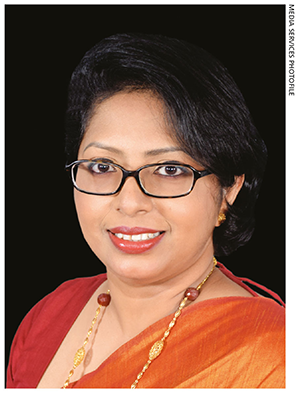MARKETING PROFESSION
STRATEGY NEEDS A MAKEOVER
Sanjana Seneviratne checks the progress of marketers in the COVID-19 era
Compiled by Lourdes Abeyeratne
Q: How has the marketing profession evolved in Sri Lanka over the last year or so?
A: This is not the world as we knew it; COVID-19 disrupted markets and lives at all levels. This disruption was unprecedented and underestimated, requiring marketers to rethink how companies go to market and engage with customers.
 After many months with most parts of the world being in lockdown, brands are coming to terms with a hard truth: the impact of the ‘new normal’ – although it is far from normal – on markets and human behaviour is significant; and ironically, there will be a prolonged period of uncertainty.
After many months with most parts of the world being in lockdown, brands are coming to terms with a hard truth: the impact of the ‘new normal’ – although it is far from normal – on markets and human behaviour is significant; and ironically, there will be a prolonged period of uncertainty.
Marketers have had to rethink strategies in an era of homebound customers, physical distancing and an unpredictable environment that forced many companies into crisis management.
During this period however, marketing emerged as the central point of businesses. With a need for flexibility and strong internal relationships to navigate changing circumstances, marketers play a crucial role in connecting various parts of a business – especially in managing relationships with consumers.
From shopper insights and brand positioning, to e-commerce and crisis communications, marketing teams are delivering higher value in the COVID-19 era.
Q: Are local marketers leveraging on the latest concepts in the profession?
A: Yes. Businesses are operating in uncharted territory as we lack best practices and case studies to guide our actions in these times.
While overall advertising expenditure is much lower than in previous years, brands are looking at e-commerce as a major opportunity.
Companies that were previously engaged in traditional media, and bricks and mortar channels, have launched successful digital marketing campaigns and leveraged online shopping platforms.
Q: What is your take on marketers’ efforts to adopt technology?
A: While the initial stages of the pandemic saw many brands struggling, most companies realised the importance of structuring for the long haul especially in highly unpredictable conditions. Many corporates built real-time data dashboards, reformulating brand strategies and slashing internal red tape to move faster.
Organisational reforms including strategic partnerships and networks are replacing simple market-based transactions, while traditional organisations and industries are being forced to look into online platforms to retain market positions.
Moreover, as physical distancing and protective measures remain the norm, shopping from our couches will seem more convenient. A stronger emphasis on e-commerce and digital channels is crucial therefore, given the role of direct to consumer (D2C) channels.
Marketers also need to strategise over new waves of data and use them to personalise offers to defined customer segments.
Another area of focus is the need to redesign shopper journeys for consumers in a different state of mind. At home, shoppers are comfortable – they want to see options in their recommended products and spend time browsing through add-ons. They’re in no rush as they can ‘add to cart’ and return for more, and shop for the entire family at different hours due to remote working schedules.
Analytics should be tracking these consumer preferences and behaviours, enabling rapid responses to opportunities or threats. Data can help brands expand the borders of digital into the physical world, to create more convenient and useful shopping experiences wherever consumers may be.
Q: How do you view the role of marketing specialists in today’s business landscape?
A: Marketing is forever evolving, and there are many techniques to learn, cases to study and strategies to research. The successful marketing professional of today will be a combination of a data specialist, digital expert and creator or curator of relevant content.
Q: What should be the main objective for marketers at this time?
A: Many organisations focussed on the technology or digitalisation of operations to a great extent. We must understand that they are important and marketers need to be competent with contemporary tools.
But one must note that this technology only provides new business models and channels for communication, not the skills required to understand customers and develop value propositions.
Therefore, marketers should ensure that they’re ahead of the curve in terms of knowing who their target audience is and what they need from businesses. This means listening and responding to changes in the market to save money, while staying relevant in target marketplaces and among competitors.




